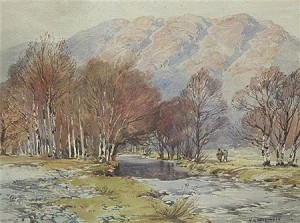
My dear friend Edwin has sent me this little piece: Jesus – a name which is above every name. He issues regular snippets which he calls Golden Nuggets (an inexhaustible vein of gold). I have taken the liberty of reproducing the same article. I am sure you will enjoy reading it.
It was originally written by Henry R. Wilkinson, a talented Christian artist who lived in Coniston, a village in the beautiful Lake District in Northern England. He died around 1970. Here is a copy of one of his paintings. Clearly he had a love for God’s creation, and this love can be seen in his work. Moreover this article paints a delightful verbal picture of our Saviour and the way in which His Name has been cherished throughout the Christian dispensation.
If you want to be on Edwin’s mailing list, please click here. Incidentally he maintains a stock of old ministry and very helpful Christian books which he provides free of charge or at a very low price (except of course for shipping costs). I am sure he will be pleased to give you more information. He trades under the name of Saville Street Distribution.
Incidentally, in the last few weeks, Edwin’s mother, Alice, was taken to be with her Lord. She was born in St Petersburg, Russia where her parents went to the same meeting as Daniel Otsing, the writer of that remarkable hymn O Lord, with our Ears and Hearts Open (number 131 in the Little Flock hymn book). As her father was Swedish, they fled the country when the communists came to power.
JESUS – a Name which is above Every Name
- It remains when all else disappears; it endures when everything else perishes, and retains fame, prestige and lustre in the midst of transitory fading splendour.
- Amongst living kings, queens, princes and princesses it is reverently honored and esteemed, and whilst the authority of such is great its dominion and power is infinitely vaster than theirs. The influence it exercises for good in an evil world far exceeds the questionable domination of all the combined dictators in the earth.
- Angels, keeping their own estate, know it and worship whilst they rejoice together in seeing it apprehended in the faith of men’s hearts. Fallen angels, devils, demons also know it, confess it, but fear and tremble.
- Many sober minded leaders amongst men recognise it, commanders of armies and navies, defenders of fortresses and outposts.
- It has flashed into the vision of falling air pilots and stirred the memories of stricken seamen in ocean depths, of dying miners in the dark tombs of the earth.
- Many a doctor has been fortified by it, whilst nurses have whispered its wonderful music to the weak and dying.
- It has been a power for hope and comfort to the despairing in concentration camps, in dread dungeons and cruel prisons.
Perish it cannot — endure it will, for the immutable win of the everlasting God has decreed it.
Schemes, plans, conspiracies, ambitions hold sway for a while but the sway of the wonderful name of JESUS continues on and on forever.
In favour and disfavour, in honour and dishonour, in fervent adoration and in· caviling reviling, in loving appreciation and in neglectful indifference, amongst believers and unbelievers, around kingly thrones and in nomadic encampments, in colleges and in workshops, amongst white races and colored, around the belt of the Equator and on Arctic ice floes, by Indian river sides and in Canadian forests — this strangely magnetic name — JESUS — is the one power to move the hearts of men.
Its unfailing testimony has echoed in the theatres and palaces of ancient Rome — it was carried to the limits of its far-flung empire. When that empire fell, the Name remained, reached Gaul and Goth, Briton and Celt, and on to northern lands, ever spreading. It traveled with and into history, reached the Dark Ages, shone in cloister and cell, wood cabin and cave, east, west, north and south, always the same in unfailing attractiveness, arising afresh for every new generation in renewing hopefulness and power for blessing. In an unceasing effort to eradicate it from the earth Satan has employed every agency, all his cunning, all his hate.
By persecution and destruction, by flattery and fraud, by patronage and promises, by corruption and violence he has never slept in his campaign to blot it out, but here it is yet. It sounds in the silence of the night, awakes with the dawn and comes into speech in the daytime. At every turn and angle it confronts us and is forced upon our attention.
It lives because He lives, and because He lives to the ages of ages His Name shall likewise endure.
Listen, reader! Is there known to you any other name like it, however great it be? Do you know any name/word in the whole vocabulary of man of which we can truly say such wonderful things?
Like a lone mountain peak rising high in gleaming majesty far above all other heights, this one unique name of unsurpassed wonder and significance soars upward in sublimity in its own great testimony to men. God intends that it shall be so in order that men universally shall look to Him — JESUS.
- There is none other name under heaven given among men whereby we must be saved. (Acts 4:12)
- Thou shalt call his name JESUS: for he shall save his people from their sins. (Luke 1:31)
- Whosoever shall call upon the name of the Lord shall be saved. (Romans 10:13)
Where else can we look with hope? It is a time of unparalleled fear and anxiety amongst men; new powers for death and destruction have been discovered and developed, and that coveted peace for which men have looked, toiled, fought and died is further away than ever, and yet it is there, all of it, in JESUS.
Who has not heard of the Good Samaritan? Who does not know of the Good Shepherd? Who has not read or heard of Him who went about doing good and healing all that were oppressed of the devil, for God was with Him?
Some names are loathsome to men; others inspire courage, others fear and terror, but the name of JESUS has a winning charm of holy attractiveness, which no other name ever could have. Nobody fled from Him in fear, but great crowds came near to hear his wonderful speaking. With what intense yearning He cried to men: “Come unto me, all ye that labor and are heavy laden, and I will give you rest.” “If any man thirst, let him come unto me, and drink.”
He has not changed. What He was He is; and the same words of earnest and loving entreaty still hold good today, coming in all their heavenly charm and sweetness from JESUS now crowned with glory.
His name is the finest credential possible. It is an imperishable commendation to every man whatever his color, race or nationality, of that marvelous grace of God which would have all men to be saved and come to the knowledge of the truth.
Golden Nuggets are published by:-
Saville Street Distribution
Venture, Princes Esplanade,
Walton-on-the-Naze, Essex CO14 8QD








